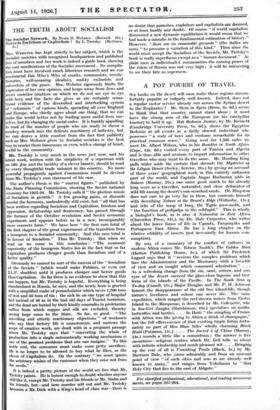THE TRUTH ABOUT SOCIALISM
Mrs. 'WEBSTER has kept strictly to her subject, which is the Socialist societies with recognized headquarters and published lists of members and her work is indeed a guide book showing the vast ramifications of the Socialist movement. Its compila- tion must have involved much laborious research and we can recommend this Who's Who of cranks, communists, revolu- tionaries, well-meaning idealists, nudity cuiturists and suhverters of the peace. Mrs. Webster rigorously limits the expression of her own opinion, and keeps away from Jews and secret societies (matters on which we do not see eye to eye with her), and the facts she gives us are certainly sensa- tional evidence of the diversified and interlocking system of " reformers " of various kinds, spreading all over England and Europe, who chiefly agree about one thing, that we can make the world better not by leading more useful lives our- selves, but by, changing the social order. It is frankly appalling to read of the number of people who are ready to throw a monkey wrench into the delicate machinery of industry, but we can derive a little comfort from the fact that publicity such as Mrs. Webster gives to Socialist societies is the best ay to render them innocuous, or even, with a change of heart, useful to the community.
Mr. Trotsky is very much in the news just now, and his latest work, written with the simplicity of a superman with an idee free and the lucidity of a clever lunatic, should be read by every thoughtful trade unionist in the country. No more powerful propaganda against Communism could be devised than Mr. Trotsky's own statement of his case.
The author's thesis. is the " control figures " published by the State Planning Commission, showing the Soviet national economy for 1925-26. Mr. Trotsky calls it " the glorious music of Socialism in growth." A few growing pains, or discords amidst the harmony, undoubtedly still exist, but " all that has been written regarding Socialism and. Capitalism, freedom and oppression, dictatorship and democracy, has passed through the furnace of the October revolution and Soviet economic experiment and appears before us in a new, incomparably more concrete form." We have here " the first sum total of the first chapter of the great experiment of the transition from a bourgeois to a Socialist community. And this sum total is in favour of Socialism." Thus Mr. Trotsky. But when we read on we come to this conclusion : " The economic superiority of the bourgeois States lies in the fact that so far Capitalism produces cheaper goods than Socialism and of a better quality."
Obviously we cannot be sure of the success of the " Socialism of the Soviets " (which would make Fabians, or even our I.L.P. shudder) until it produces cheaper and better goods than Capitalism. So far there is no evidence to show that this can happen, but Mr. Trotsky is hopeful. Everything is being standardized in Russia, he says, and the newly born is greeted with a simplified make of perambulator which saves 1,700 tons of iron and 85 tons of tin : the sick lie on one type of hospital bed instead of 40 as in the bad old days of Tsarist terrorism, and the dead are buried by their kindly comrades in proletarian coffins from which copper and silk are excluded, thereby saving large sums to the State. So far, so good. " The snivelling and utterly reactionary objections " of workmen who say that factory life is monotonous, and narrows the scope of creative work, are dealt with in a pregnant passage where Mr. Trotsky says that " converting the whole of production into a single automatically working mechanism is one of the greatest problems that one can imagine." To this noble end, the consumer must make some petty sacrifices. He is no longer to be allowed to buy what he likes, as the slaves of .Capitalism do. On the contrary ." we must ignore the arbitrary wishes of the customer when they arise not from his needs."
It is indeed a pretty picture-of the world set free that Mr. Trotsky paints. He is honest enough to doubt whether anyone will like it, except Mr. Trotsky and his friends or Mr. Stalin and his friends, but—and here murder will out and Mr. Trotsky becomes a Mr. Dick with a King's head of class war—there is no doubt that parasites, exploiters and capitalists are doomed, or at least hardly any doubt. Of course " if world capitalism discovered a new dynamic equilibrium it would mean that we had made a mistake in the fundamental estimation of history." However, " there are no reasonable grounds " (the italics are ours) " to presume a variation of this kind." Then since the world must accept the Socialism of the Soviets, Mr. Trotsky's book is really superfluous except as a " human document." As plain men in individualist communities the earning power of the rulers of Russia was not very high : it will be interesting to see their fate as supermen.


































 Previous page
Previous page